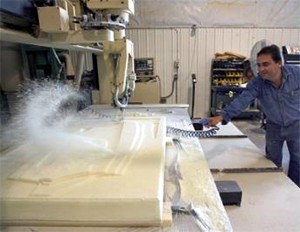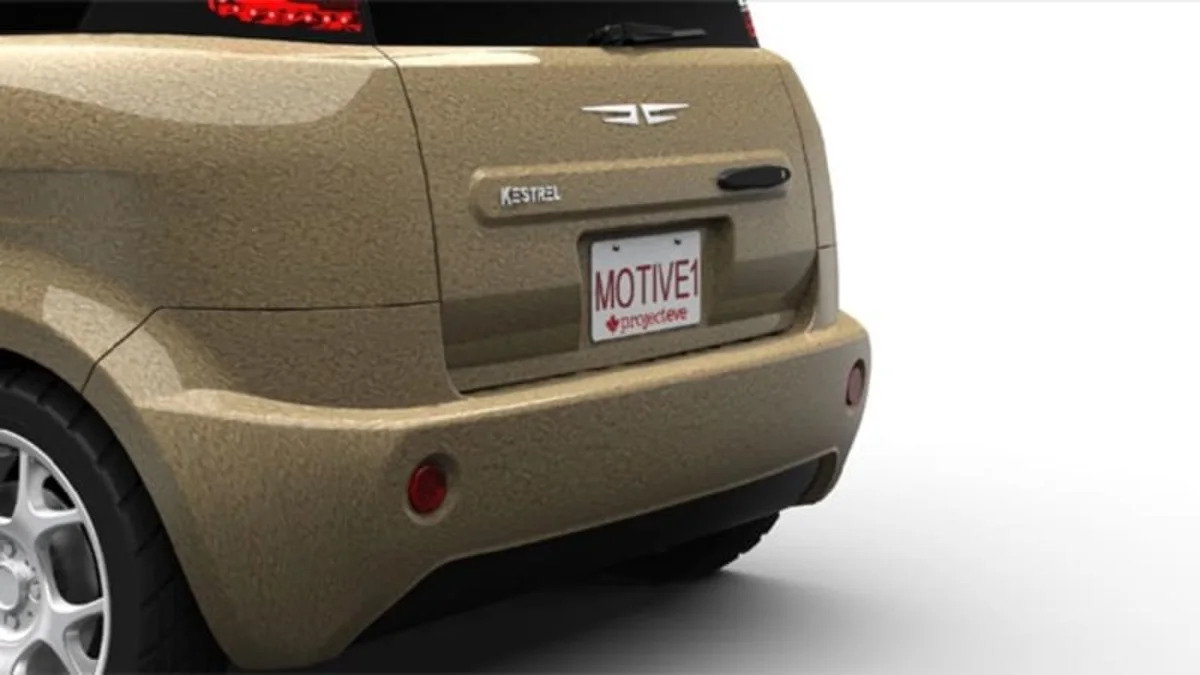 If our post about Motive Industries hemp composite electric car had you jonesin' for more info, not to worry. We've just scored more straight dope on the green machine that we're only too happy to pass
If our post about Motive Industries hemp composite electric car had you jonesin' for more info, not to worry. We've just scored more straight dope on the green machine that we're only too happy to pass All joking aside, the more we learn about the Kestrel, the more excited we get. The concept embodies a great many of the qualities sought after in an electric vehicle, and with government and private industry supporting the project, it just might become Canada's first domestic automobile since the Bricklin.
At just 850 kg (1874 lbs), the hemp composite construction fulfills its light-weight promise and allows the four-passenger three door to get away with using only 16 kWhs worth of lithium battery to achieve an estimated range of 160 kilometers (100 miles). With a top speed of 135 km/h (83.89 miles per hour), it should have no problem handling the highway either.
We're already diggin' the look of the hemp body panels as shown in the render above and look forward to seeing the Kestrel concept in a couple weeks at the EV 2010 VÉ Conference and Trade Show in Vancouver. If they stick to their schedule, we should see a production prototype next summer and actual production vehicles as soon as 2012. Scroll down for the official press release as well as a bit of video from a couple years back featuring Motive Industries president Nathan Armstrong discussing his background, his company's focus and prior projects. Very impressive.
[Source: Motive Industries]
PRESS RELEASE
Motive Unveils Kestrel Specs and Manufacturing Details
Calgary, AB – August 31, 2010 – In response to the unprecedented interest in the "Kestrel Car" Motive has released more Specifications on the upcoming vehicle as well as details on the manufacturing strategy and partners.
"Response to this innovative vehicle design and manufacturing approach has been phenomenal," stated Nathan Armstrong, President of Motive. "When we get hundreds of calls from potential industry partners and media as far away as India, we know we are presenting unique solutions that will help solve many of the challenges facing the automotive industry, not only environmental but also logistical."
Initial production work on the Kestrel four-passenger electric vehicle prototype began in August.
The Kestrel will weigh an estimated 850kg, achieve a top speed of 135 km/h and a maximum range of 160km with a lithium-ion battery. The Kestrel has been designed and will be manufactured entirely in Canada by a yet undisclosed consortium of technology and manufacturing partners coming together under the title of Project Eve.
Motive is a proponent of advanced materials and rapid manufacturing techniques. The Company's purpose in creating the Kestrel goes beyond simply creating another electric vehicle option for consumers. The company states "the Kestrel was designed to encourage a new era in design and manufacturing for the automotive industry and also to support the Canadian perspective by supporting industry and jobs. The project is developed to fulfill a mandate from the Government to identify the feasibility, costs and benefits of creating a Canadian brand of highway-capable EV's". The manufacturing techniques used for the Kestrel by Motive and its partners will allow the vehicle to be made profitably at smaller initial volumes than traditional vehicles. "The cost to tool a traditional vehicle is in the hundreds of millions. The techniques we are using will allow us to scale up the tooling and manufacturing process as demand increases with ramp-up costs affordable for a new company".
The other benefits achieved using advanced composites versus metal are increased impact absorption, rust resistance, and reduced weight. "Composite materials have been used in advanced applications for many years because of its relative light weight and ability to absorb impact, while a steel stamped vehicle will absorb impact by crumpling under pressure, a composite vehicle will absorb the energy then return to its original shape", comments Nathan. This was recently verified by Lotus who found similar results with their Evora sports car.
Kestrel Specs:
- Architecture: Compact 4 passengers, 3 doors
- Drive train: Electric, single speed
- Vehicle weight: 850kg
- Top speed: 135 km/h
- Range: 160km
- Battery: 16 kWh lithium
Manufacturing Specs:
- Construction type: Bio-fiber based composite
- Technology partners: Undisclosed
- Manufacturing partners: Undisclosed
- Production prototype tour target: 2011
- Production manufacturing target: 2012
- Transport Canada Certification target: Late 2012
About Motive
Motive is an elite transportation design firm specializing in advanced design and advanced material manufacturing application. Over the past 15 years the Motive team has worked on more than 120 vehicle programs including 10 full electric vehicle programs. The company's unique blend of design and engineering capabilities and industry experience has allowed Motive to create processes which accelerate project cycles, reduce cost and decrease time to market. Motive works with existing car companies and manufacturing partners worldwide to architect advanced vehicles from concept through production. www.motiveind.com
More information on the bio-composite materials can be found at:
http://www.arc.ab.ca/areas-of-focus/industrial-bioproducts/industrial-biofibres-centre/
More information on Project Eve can be found at:
http://www.projecteve.ca and Facebook under Project Eve
The video meant to be presented here is no longer available. Sorry for the inconvenience.
Motive Pt 1


Sign in to post
Please sign in to leave a comment.
Continue